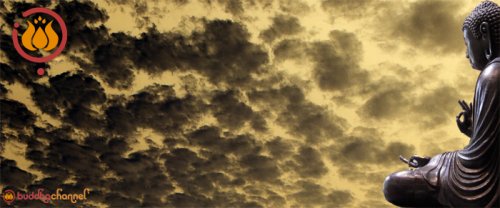
256-257
doesn’t mean you’re a judge.
The wise one, weighing both
the right judgment & wrong,
judges others impartially —
unhurriedly, in line with the Dhamma,
guarding the Dhamma,
guarded by Dhamma,
intelligent:
he’s called a judge.
258-259
doesn’t mean one is wise.
Whoever’s secure —
no hostility,
fear —
is said to be wise.
Simply talking a lot
doesn’t maintain the Dhamma.
Whoever
— although he’s heard next to nothing —
sees Dhamma through his body,
is not heedless of Dhamma:
he’s one who maintains the Dhamma.
260-261
doesn’t mean one’s an elder.
Advanced in years,
one’s called an old fool.
But one in whom there is
truth, restraint,
rectitude, gentleness,
self-control —
he’s called an elder,
his impurities disgorged,
enlightened.
262-263
or lotus-like coloring
does an envious, miserly cheat
become an exemplary man.
But one in whom this is
cut through
up-rooted
wiped out —
he’s called exemplary,
his aversion disgorged,
intelligent.
264-265
doesn’t mean a contemplative.
The liar observing no duties,
filled with greed & desire:
what kind of contemplative’s he?
But whoever tunes out
the dissonance
of his evil qualities
— large or small —
in every way
by bringing evil to consonance:
he’s called a contemplative.
266-267
doesn’t mean one’s a monk.
As long as one follows
householders’ ways,
one is no monk at all.
But whoever puts aside
both merit & evil and,
living the chaste life,
judiciously
goes through the world:
he’s called a monk.
268-269
does someone confused
and unknowing
turn into a sage.
But whoever — wise,
as if holding the scales,
taking the excellent —
rejects evil deeds:
he is a sage,
that’s how he’s a sage.
Whoever can weigh
both sides of the world:
that’s how he’s called
a sage.
270
does one become noble.
One is termed noble
for being gentle
to all living things.
271-272
don’t
on account of
your precepts & practices,
great erudition,
concentration attainments,
secluded dwelling,
or the thought, ‘I touch
the renunciate ease
that run-of-the-mill people
don’t know’:
ever let yourself get complacent
when the ending of effluents
is still unattained.
Provenance: ©1997 Thanissaro Bhikkhu.
Transcribed from a file provided by the translator.
This Access to Insight edition is ©1997–2009 John T. Bullitt.
Terms of use: You may copy, reformat, reprint, republish, and redistribute this work in any medium whatsoever, provided that:
- (1) you only make such copies, etc. available free of charge;
- (2) you clearly indicate that any derivatives of this work (including translations) are derived from this source document;
- and (3) you include the full text of this license in any copies or derivatives of this work.
Otherwise, all rights reserved.
All the sutras HERE




